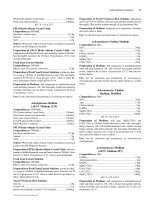HANDBOOK OF COUNSELING PSYCHOLOGY FOURTH EDITION ppt
Bạn đang xem bản rút gọn của tài liệu. Xem và tải ngay bản đầy đủ của tài liệu tại đây (2.65 MB, 656 trang )
c 01 January 15, 2008 i
HANDBOOK OF COUNSELING
PSYCHOLOGY
FOURTH EDITION
Edited by
Steven D. Brown
Robert W. Lent
John Wiley & Sons, Inc.
c 01 January 15, 2008 ii
This book is printed on acid-free paper.∞
Copyright © 2008 by John Wiley & Sons, Inc. All rights reserved.
Published by John Wiley & Sons, Inc., Hoboken, New Jersey.
Published simultaneously in Canada.
No part of this publication may be reproduced, stored in a retrieval system, or transmitted in any form or by any
means, electronic, mechanical, photocopying, recording, scanning, or otherwise, except as permitted under
Section 107 or 108 of the 1976 United States Copyright Act, without either the prior written permission of the
Publisher, or authorization through payment of the appropriate per-copy fee to the Copyright Clearance Center,
Inc., 222 Rosewood Drive, Danvers, MA 01923, (978) 750-8400, fax (978) 646-8600, or on the web at
www.copyright.com. Requests to the Publisher for permission should be addressed to the Permissions
Department, John Wiley & Sons, Inc., 111 River Street, Hoboken, NJ 07030, (201) 748-6011, fax (201)
748-6008, or online at />Limit of Liability/Disclaimer of Warranty: While the publisher and author have used their best efforts in
preparing this book, they make no representations or warranties with respect to the accuracy or completeness of
the contents of this book and specifically disclaim any implied warranties of merchantability or fitness for a
particular purpose. No warranty may be created or extended by sales representatives or written sales materials.
The advice and strategies contained herein may not be suitable for your situation. You should consult with a
professional where appropriate. Neither the publisher nor author shall be liable for any loss of profit or any other
commercial damages, including but not limited to special, incidental, consequential, or other damages.
This publication is designed to provide accurate and authoritative information in regard to the subject matter
covered. It is sold with the understanding that the publisher is not engaged in rendering professional services. If
legal, accounting, medical, psychological or any other expert assistance is required, the services of a competent
professional person should be sought.
Designations used by companies to distinguish their products are often claimed as trademarks. In all instances
where John Wiley & Sons, Inc. is aware of a claim, the product names appear in initial capital or all capital
letters. Readers, however, should contact the appropriate companies for more complete information regarding
trademarks and registration.
For general information on our other products and services please contact our Customer Care Department within
the United States at (800) 762-2974, outside the United States at (317) 572-3993 or fax (317) 572-4002.
Wiley also publishes its books in a variety of electronic formats. Some content that appears in print may not be
available in electronic books. For more information about Wiley products, visit our web site at www.wiley.com.
Library of Congress Cataloging-in-Publication Data:
Handbook of counseling psychology / edited by Steven D. Brown,
Robert W. Lent.—4th ed.
p. cm.
Includes bibliographical references.
ISBN-13: 978-0-470-09622-2 (cloth)
1. Counseling psychology. 2. Psychology, Applied. I. Brown, Steven D.
(Steven Douglas), 1947– II. Lent, Robert W. (Robert William), 1953–
BF637.C6H315 2008
158
.3—dc22 2007026258
Printed in the United States of America.
10987654321
c 01 January 15, 2008 iii
To Linda Heath for years of love, friendship, and good
humor; Zachary and Kathryn Brown for their support
and myriad ways for keeping life interesting; Elma and
Irvin Brown for always believing in me; Ren´e Dawis
and Lloyd Lofquist for serving as exceptional scholarly
role models early in my career; Suzette Speight and Liz
Vera for being such professionally stimulating and
supportive colleagues; and my students for their
invaluable contributions to our work together.
S. D. B.
To Ellen and Jeremy, who taught me that work has its
place but, at the end of the day (and all during the
day), nothing beats family; Rich Russell, for being my
advisor, mentor, “big brother,” and friend; Ohio State’s
counseling psychology program, for being the
graduate training powerhouse it was; my colleagues at
Maryland, for continually inspiring me with their
dedication to scholarship and practice; my advisees,
for their infusion of curiosity and energy; and Howie
Gresh, my Coney Island pal, for keeping me laughing
for 50 years.
R. W. L.
c 01 January 15, 2008 x
c 01 January 15, 2008 v
Contributors
Saba Rasheed Ali, PhD
Psychological and Quantitative Foundations
The University of Iowa
Iowa City, Iowa
Consuelo Arbona, PhD
Department of Educational Psychology
University of Houston
Houston, Texas
Patrick Ian Armstrong, PhD
Department of Psychology
Iowa State University
Ames, Iowa
Rashanta A. Bledman, BA
Department of Educational, School, and
Counseling Psychology
University of Missouri–Columbia
Columbia, Missouri
Nancy E. Betz, PhD
Department of Psychology
The Ohio State University
Columbus, Ohio
Kathleen J. Bieschke, PhD
Department of Counselor Education,
Counseling Psychology, and
Rehabilitation Services
Pennsylvania State University
University Park, Pennsylvania
Gary R. Brooks, PhD
Department of Psychology and
Neurosciences
Baylor University
Waco, Texas
Steven D. Brown, PhD
Counseling Psychology Program
Loyola University Chicago
Chicago, Illinois
Hung Chiao, MEd
Department of Educational, School, and
Counseling Psychology
University of Missouri–Columbia
Columbia, Missouri
Kathleen Chwalisz, PhD
Department of Psychology
Southern Illinois University
Carbondale, Illinois
Nicole Coleman, PhD
Department of Educational Psychology
University of Houston
Houston, Texas
Madonna G. Constantine, PhD
Department of Counseling and Clinical
Psychology
Teachers College, Columbia
University
New York, New York
James M. Croteau, PhD
Department of Counselor Education and
Counseling Psychology
Western Michigan University
Kalamazoo, Michigan
Devon L. Cummings, MA
Department of Psychology
The University of Akron
Akron, Ohio
v
c 01 January 15, 2008 vi
vi CONTRIBUTORS
Steven J. Danish, PhD
Counseling Psychology Program
Virginia Commonwealth University
Richmond, Virginia
Lisa M. Edwards, PhD
Department of Counseling and Educational
Psychology
Marquette University
Milwaukee, Wisconsin
Timothy R. Elliott, PhD
Department of Educational Psychology
Texas A& M University
College Station, Texas
Dorothy L. Espelage, PhD
Department of Educational Psychology
University of Illinois at Urbana-Champaign
Champaign, Illinois
Ruth E. Fassinger, PhD
Department of Counseling and Personnel
Services
University of Maryland
College Park, Maryland
James Fauth, PhD
Center for Research on Psychological
Practice
Antioch University New England
Keene, New Hampshire
Tanya Forneris, PhD
School of Kinesiology and
Health Studies
Queens University
Kingston, Ontario, Canada
Nadya A. Fouad, PhD
Department of Educational Psychology
University of Wisconsin—Milwaukee
Milwaukee, Wisconsin
Debra L. Franko, PhD
Department of Counseling and Applied
Educational Psychology
Northeastern University
Boston, Massachusetts
Charles J. Gelso, PhD
Department of Psychology
University of Maryland
College Park, Maryland
Diane Y. Genther, BA
Psychology and Research in
Education
University of Kansas
Lawrence, Kansas
Lucia Albino Gilbert, PhD
Office of the Provost
University of Santa Clara
Santa Clara, California
Rodney K. Goodyear, PhD
Rossier School of Education
University of Southern California
Los Angeles, California
Paul A. Gore Jr., PhD
Department of Educational Psychology
University of Utah
Salt Lake City, Utah
Arpana Gupta, MEd
Department of Psychology
University of Tennessee
Knoxville, Tennessee
Emily Hamilton, MA
Department of Educational, School, and
Counseling Psychology
University of Missouri–Columbia
Columbia, Missouri
Jeffrey A. Hayes, PhD
Department of Counselor Education,
Counseling Psychology, and
Rehabilitation Services
Pennsylvania State University
University Park, Pennsylvania
P. Paul Heppner, PhD
Department of Educational, School, and
Counseling Psychology
University of Missouri–Columbia
Columbia, Missouri
c 01 January 15, 2008 vii
CONTRIBUTORS vii
Clara E. Hill, PhD
Department of Psychology
University of Maryland
College Park, Maryland
Jennifer M. Hill, BA
Psychological and Quantitative
Foundations
The University of Iowa
Iowa City, Iowa
Arthur M. Horne, PhD
Department of Counseling and Human
Development Services
University of Georgia
Athens, Georgia
Zac E. Imel, MA
Department of Counseling Psychology
University of Wisconsin–Madison
Madison, Wisconsin
Arpana G. Inman, PhD
Department of Education and Human
Services
Lehigh University
Bethlehem, Pennsylvania
Neeta Kantamneni, MS
Department of Educational Psychology
University of Wisconsin–Milwaukee
Milwaukee, Wisconsin
Mai M. Kindaichi, MA, EdM
Department of Counseling and Clinical
Psychology
Teachers College, Columbia University
New York, New York
Sarah Knox, PhD
Department of Educational and Counseling
Psychology
Marquette University
Milwaukee, Wisconsin
Nicholas Ladany, PhD
Department of Education and Human
Services
Lehigh University
Bethlehem, Pennsylvania
Michael J. Lambert, PhD
Department of Psychology
Brigham Young University
Provo, Utah
Christine M. Lee, PhD
Department of Psychiatry and Behavioral
Sciences
University of Washington
Seattle, Washington
Robert W. Lent, PhD
Department of Counseling and Personnel
Services
University of Maryland
College Park, Maryland
Frederick T. L. Leong, PhD
Department of Psychology
Michigan State University
East Lansing, Michigan
Wade C. Leuwerke, PhD
Department of Counselor
Education
Drake University
Des Moines, Iowa
James W. Lichtenberg, PhD
Psychology and Research in
Education
University of Kansas
Lawrence, Kansas
William Ming Liu, PhD
Psychological and Quantitative
Foundations
The University of Iowa
Iowa City, Iowa
Shane J. Lopez, PhD
Psychology and Research in Education
University of Kansas
Lawrence, Kansas
Jessica L. Manning, MA
Department of Counselor Education and
Counseling Psychology
Western Michigan University
Kalamazoo, Michigan
c 01 February 1, 2008 viii
viii CONTRIBUTORS
Matthew P. Martens, PhD
Department of Counseling, Educational
Psychology, and Research
University of Memphis
Memphis, Tennessee
Matthew J. Miller, PhD
Division of Counseling Psychology
University at Albany, SUNY
Albany, New York
Laurie B. Mintz, PhD
Department of Educational, School,
and Counseling Psychology
University of Missouri–Columbia
Columbia, Missouri
Marie L. Miville, PhD
Department of Counseling and Clinical
Psychology
Teachers College, Columbia University
New York, New York
Clayton Neighbors, PhD
Department of Psychiatry and Behavioral
Sciences
University of Washington
Seattle, Washington
Roberta L. Nutt, PhD
Association of State and
Provincial Psychology Boards
Montgomery, Alabama
Ezemenari Obasi, PhD
Department of Psychology
Southern Illinois University
Carbondale, Illinois
David B. Peterson, PhD
Division of Special Education and
Counseling
California State University Los
Angeles
Los Angeles, California
Joseph G. Ponterotto, PhD
Division of Psychological and Educational
Services
Fordham University at Lincoln Center
New York, New York
Jill Rader, PhD
Independent Practice
Austin, Texas
Daryn Rahardja, MS
W. W. Wright School of Education
Indiana University
Bloomington, Indiana
Lillian M. Range, PhD
Professional Programs Division
Our Lady of Holy Cross College
New Orleans, Louisiana
Christopher C. Rector, PhD
Counseling Psychology Program
Loyola University Chicago
Chicago, Illinois
James R. Rogers, PhD
Department of Psychology
The University of Akron
Akron, Ohio
James B. Rounds, PhD
Department of Educational
Psychology
University of Illinois at Urbana-
Champaign
Champaign, IL
Lisa Wallner Samstag, PhD
Department of Psychology
Long Island University
Brooklyn, New York
Hung-Bin Sheu, PhD
Division of Psychology in
Education
Arizona State University
Tempe, Arizona
Suzette L. Speight, PhD
Counseling Psychology Program
Loyola University Chicago
Chicago, Illinois
Mindi N. Thompson, MA
Department of Psychology
The University of Akron
Akron, Ohio
c 01 January 15, 2008 ix
CONTRIBUTORS ix
Elizabeth M. Vera, PhD
Counseling Psychology Program
Loyola University Chicago
Chicago, Illinois
David A. Vermeersch, PhD
Department of Psychology
Loma Linda University
Loma Linda, California
Bruce E. Wampold, PhD
Department of Counseling Psychology
University of Wisconsin–Madison
Madison, Wisconsin
James L. Werth Jr., PhD
Department of Psychology
The University of Akron
Akron, Ohio
John S. Westefeld, PhD
Psychological and Quantitative
Foundations
The University of Iowa
Iowa City, Iowa
Susan C. Whiston, PhD
W. W. Wright School of Education
Indiana University
Bloomington, Indiana
Elizabeth Nutt Williams, PhD
Department of Psychology
St. Mary’s College of Maryland
St. Mary’s, Maryland
c 01 January 15, 2008 iv
c 01 January 15, 2008 xi
Preface
This edition of theHandbook of Counseling Psychology,like all three prior editions, has three primary
objectives: (1) to provide a scholarly review of important areas of counseling psychology inquiry, (2) to
elaborate directions forfuture research, and (3) to draw specific suggestions for practice that derive from
the scholarly literature in counseling psychology and related disciplines.Also, as in the third edition,we
asked authors, as much as possible, to report effect sizes and to use these, and published meta-analyses,
to draw inferences about the current state of knowledge in the field, to suggest questions for future
investigation, and to derive practice implications. We are pleased to see that the research literature on
topics addressed in this edition had advanced sufficiently so that, in many cases, our authors could use
meta-analyses and report effect sizes to summarize their literature and draw implications. We are also
pleased that many authors calculated and reported effect sizes when preexisting meta-analyses were not
available.
Despite the broad continuities with prior editions, this edition departs from the others in significant
ways. First, as readers of past editions will notice, there are more, but shorter, chapters in this edition.
Our decision to include shorter chapters on more focused topics was solidified by an email survey we
conducted with the membership of the Society of Counseling Psychology. Our goals were to capture
advances ina wider rangeof the fieldwhile allowing authorsto covercircumscribed topics inreasonable
depth. We hope readers find this choice to be a good one. We thank our authors for trying so hard to
follow length guidelines (not an easy task) and for their graciousness when difficult decisions had to be
made to reduce their text to page limits.
The section topics and their ordering also depart from earlier editions. Part I of this edition, a
Handbookmainstay, coversimportant currentprofessionaland scientificissues,but manyofthe topicsin
this edition arenew and reflect importantemerging professional trends.The coverage inthis section was
largely suggested to us by our survey of Division 17 members. Topics that were mentioned frequently
included the new APA ethics code; managed care and prescription privileges; the growing use of
technology in research, assessment,and counseling; the international growth ofcounseling psychology;
social justice issues; and the growing attention to positive psychology. Each of these topics is covered
in Part I.
The subsequent three sections cover important research in the most active areas of counseling psy-
chology inquiry over the past 10 years. Brent Mallinckrodt, in response to our e-mail survey, kindly
provided us with a content (key word) analysis of research published in theJournal of Counseling
PsychologyandThe Counseling Psychologistsince the publication of the third edition of thisHand-
book. The results revealed that the most active areas of counseling psychology research in this time
frame were, in order, multicultural psychology, counseling and supervision process and outcome, and
vocational psychology. These topics, therefore, are covered in Part II (multicultural psychology), Part
III (counseling and supervision), and Part IV (vocational psychology) of this edition.
Part Vcovers topicson development and prevention.AlthoughBrent Mallinckrodt’s content analysis
did not reveal that prevention per se engages the research attention of large numbers of counseling psy-
chologists,it didshowthatmany inourfieldare interestedinhealthand disease,suicide,substanceabuse,
xi
c 01 January 15, 2008 xii
xii PREFACE
eating disorders, and school violence. Because we continue to believe that development and prevention
are of historic and contemporary significance to counseling psychology, we decided to include chapters
on each of the preceding topics, but to ask authors to take a preventive rather than remedial-treatment
approach to them. These topics are complemented by two promotion-oriented chapters on resiliency
interventions for at-risk youth and interventions to promote positive development and competencies.
We hope the chapters in Part V will stimulate readers to give renewed thought to promoting positive
development and resiliency and preventing (rather than only treating) psychological and health-related
problems.
ACKNOWLEDGMENTS
We have many people to thank for their help throughout this project. First, we thank the many Division
17 memberswho respondedto ouremail survey.Their suggestionswere invaluablein helpingus createa
volume that spoke as much aspossible to thecurrent interests andconcerns of thoseworking in ourfield.
Second, we thank Brent Mallinckrodt for going above and beyond what we had asked for in the survey.
His content analysis gave us an excellent picture of contemporary counseling psychology research and
provided us with an empirical basis for organizing this edition of theHandbook. Third, we are indebted
to topicexpertswho tooktime outof their busyschedules tohelp usconsiderwhat toinclude ineach Part.
After decidingonthe mainsections anddevelopinga preliminaryset ofchaptertopics ineach section,we
emailed experts in each area (often multiple times) for input and suggestions about content and possible
authors. The ultimate set of topics covered in each Part owes much to the thoughtful suggestions of
Consuelo Arbona, Fred Borgen, Jean Carter, Ruth Fassinger, Nadya Fouad, Charlie Gelso, Paul Gore,
Puncky Heppner, Clara Hill, Mary Ann Hoffman, Fred Leong, Jim Lichtenberg, Brent Mallinckrodt,
Matt Miller, Laurie Mintz, Karen Multon, Karen O’Brien, Joe Ponterotto, Jim Rounds, Mark Savickas,
Derald Wing Sue, Terry Tracey, Liz Vera, and Bruce Wampold.
We are also indebted to Tracey Belmont, who served as our editor in the beginning stages of this
project, for getting us started and for her always helpful suggestions. We are equally indebted to Lisa
Gebo, our editor at Wiley, who kept our noses to the grindstone and shepherded the project through to
its completion. Lisa’s graciousness and good humor are very much appreciated.
As always, we thank our families for their patience, support, and inspiration. We could not have
completed this edition of theHandbookwithout them. Finally, we thank each other. Although a bit
out of the ordinary for an acknowledgment, we’ve had, and continue to have, a heck of a professional
run together based on mutual respect, complementary talents, and a long-lasting friendship—three
characteristics that have sustained our professional collaborations and have, for each of us, enhanced
our lives in innumerable ways.
S
TEVEN D. BROWN
ROBERTW. LENT
c 01 January 15, 2008 xiii
Contents
PART I: PROFESSIONAL AND SCIENTIFIC ISSUES
1. Legal and Ethical Issues Affecting Counseling Psychologists 3
James L. Werth Jr., Devon L. Cummings, and Mindi N. Thompson
2. The Changing Landscape of Professional Practice in Counseling Psychology 21
James W. Lichtenberg, Rodney K. Goodyear, and Diane Y. Genther
3. Technological Advances: Implications for Counseling Psychology Research, Training,
and Practice 38
Paul A. Gore Jr. and Wade C. Leuwerke
4. Social Justice and Counseling Psychology: A Challenge to the Profession 54
Suzette L. Speight and Elizabeth M. Vera
5. A Growing Internationalization of Counseling Psychology 68
P. Paul Heppner, Frederick T. L. Leong, and Hung Chiao
6. The Interface of Counseling Psychology and Positive Psychology: Assessing and
Promoting Strengths 86
Shane J. Lopez and Lisa M. Edwards
PART II: DIVERSITY AND MULTICULTURAL PSYCHOLOGY
7. Conceptual and Measurement Issues in Multicultural Psychology Research 103
Matthew J. Miller and Hung-Bin Sheu
8. Theoretical and Empirical Advances in Multicultural Counseling and Psychology 121
Joseph G. Ponterotto
9. Multicultural Competence in Counseling Psychology Practice and Training 141
Madonna G. Constantine, Marie L. Miville, and Mai M. Kindaichi
xiii
c 01 January 15, 2008 xiv
xiv CONTENTS
10. Social Class and Classism: Understanding the Psychological Impact of Poverty
and Inequality 159
William Ming Liu and Saba Rasheed Ali
11. Psychology of Gender 176
Roberta L. Nutt and Gary R. Brooks
12. Counseling Psychology and Sexual Orientation: History, Selective Trends, and Future
Directions 194
James M. Croteau, Kathleen J. Bieschke, Ruth E. Fassinger, and Jessica L. Manning
13. Advances in Conceptualizing and Studying Disability 212
David B. Peterson and Timothy R. Elliott
PART III: COUNSELING AND SUPERVISION
14. Measuring and Improving Psychotherapy Outcome in Routine Practice 233
Michael J. Lambert and David A. Vermeersch
15. The Importance of Treatment and the Science of Common Factors in Psychotherapy 249
Zac E. Imel and Bruce E. Wampold
16. A Tripartite Model of the Therapeutic Relationship 267
Charles J. Gelso and Lisa Wallner Samstag
17. Facilitating Insight in Counseling and Psychotherapy 284
Clara E. Hill and Sarah Knox
18. Therapist Self-Awareness: Interdisciplinary Connections and Future Directions 303
Elizabeth Nutt Williams, Jeffrey A. Hayes, and James Fauth
19. Culture and Race in Counseling and Psychotherapy: A Critical Review of
the Literature 320
Frederick T. L. Leong and Arpana Gupta
20. Developments in Counseling Skills Training and Supervision 338
Nicholas Ladany and Arpana G. Inman
PART IV: CAREER DEVELOPMENT AND VOCATIONAL PSYCHOLOGY
21. Advances in Vocational Theories 357
Nancy E. Betz
22. Vocational Psychology and Individual Differences 375
Patrick Ian Armstrong and James B. Rounds
c 01 January 15, 2008 xv
CONTENTS xv
23. Conceptualizing and Diagnosing Problems in Vocational Decision Making 392
Steven D. Brown and Christopher C. Rector
24. Contextual Factors in Vocational Psychology: Intersections of Individual, Group,
and Societal Dimensions 408
Nadya A. Fouad and Neeta Kantamneni
25. Work, Family, and Dual-Earner Couples: Implications for Research and Practice 426
Lucia Albino Gilbert and Jill Rader
26. Vocational Counseling Process and Outcome 444
Susan C. Whiston and Daryn Rahardja
27. Understanding and Promoting Work Satisfaction: An Integrative View 462
Robert W. Lent
PART V: DEVELOPMENT AND PREVENTION
28. Risk and Resilience 483
Consuelo Arbona and Nicole Coleman
29. Promoting Positive Development and Competency across the Life Span 500
Steven J. Danish and Tanya Forneris
30. Promoting Health and Preventing and Reducing Disease 517
Kathleen Chwalisz and Ezemenari Obasi
31. Suicide Prevention 535
John S. Westefeld, Lillian M. Range, James R. Rogers, and Jennifer M. Hill
32. Substance Abuse Prevention and Treatment 552
Matthew P. Martens, Clayton Neighbors, and Christine M. Lee
33. Preventing Eating and Weight-Related Disorders: Toward an Integrated Best
Practices Approach 570
Laurie B. Mintz, Emily Hamilton, Rashanta A. Bledman, and Debra L. Franko
34. School Violence and Bullying Prevention: From Research-Based Explanations to
Empirically Based Solutions 588
Dorothy L. Espelage and Arthur M. Horne
Author Index 607
Subject Index 629
c 01 January 15, 2008 xvi
c December 28, 2007 1
PART I
Professional and Scientific Issues
c January 15, 2008 2
c 01 December 28, 2007 3
CHAPTER 1
Legal and Ethical Issues Affecting Counseling
Psychologists
JAMES L. WERTH JR.
DEVON L. CUMMINGS
MINDI N. THOMPSON
Many ethical and legal developments have affected the practice, research, and education of counseling
psychologists since Kitchener and Anderson’s (2000) chapter was written for the previous edition of
theHandbook. Most notably, the American Psychological Association (APA, 2002) revised its Ethical
Principles of Psychologists and Code of Conduct (Ethics Code). In addition, the implications of laws
such as the Health Insurance Portability and Accountability Act (HIPAA) are significant. Further, such
professional issues as competence and impairment have received widespread attention in psychology.
This chapter provides an overview of a selected set of legal and ethical issues currently affecting coun-
seling psychologists. We focus primarily on developments since the previous edition of theHandbook,
but for the sake of comprehensiveness, we include reviews of areas that have continuing relevance.
We first discuss fundamental risk management considerations that psychologists or trainees should
keep in mind regardless of their specific situation. Next there are two major sections, each with several
subcomponents. Because of the significant energy invested in examining and defining professional
competence, we highlight the movement to define competencies, issues related to professionals or
students with competence problems, and self-care. We then review several potentially challenging
ethical situations: (a) dealing with conflicts between professional ethics and the demands of employers,
(b) fulfillingthe dutyto protect, (c)protecting theintegrity of the assessment process,and (d)conducting
action research and examining socially sensitive topics. However, although it is also important to
considerthe ethicalandlegalimplications of recentadvancesinonline therapy,assessment,andresearch,
we do not include these activities here because they are discussed by Gore and Leuwerke (Chapter 3,
this volume).
Because there are comprehensive sources that detail the revisions to the APA’s (2002) new Ethics
Code and the rationale for these revisions (e.g., Fisher, 2003; Knapp & VandeCreek, 2003), we do not
discuss them here. However, we do want to note that several leading ethicists in counseling psychology
contributed material that helped shape the current version of the Ethics Code, especially its aspirational
General Principles. For example, although credit isrightfully given to Beauchamp and Childress (1979)
for initially articulating the ethical metaprinciples of autonomy, beneficence, nonmaleficence, and jus-
tice, it was Karen Kitchener who, in a 1984 article in TheCounseling Psychologist(TCP), brought
the metaprinciples into psychology. Ideas present in Meara, Schmidt, and Day’s (1996)TCParticle on
virtue ethics also are evident in the General Principles. Thus, counseling psychologists have played an
important role in the conceptualization of psychology’s ethical theory and practice.
3
c 01 December 28, 2007 4
4 LEGAL AND ETHICAL ISSUES AFFECTING COUNSELING PSYCHOLOGISTS
RISK MANAGEMENT
No chapter on ethical and legal issues would be complete without a discussion of informed consent,
documentation, consultation, and the use of an ethical decision-making model. Keeping these consider-
ations in mind andfollowing the suggestions in thischapter can help not only toprotect the psychologist
or trainee but to maximize the likelihood that the client, evaluee, or research participant receives the
best possible treatment. Because most of the discussion has revolved around the relevance of these
aspects to providing psychotherapy, we focus on this professional activity in the following discussion,
but the points raised are just as relevant in other situations.
Informed Consent
One of the most essential things psychologists and graduate students can do to reduce the possibility of
having ethical or legalcharges filed against them is to provide thoroughinformed consent to clients (and
their guardian(s) if the client is unable legally to make decisions for her- or himself). The importance
of informed consent is underscored throughout the new APA (2002) Ethics Code. What to include
in informed consent can be found in the Ethics Code as well as in commentaries on the code (e.g.,
Fisher, 2003), state regulations, and journal articles (e.g., Pomerantz & Handelsman, 2004; Talbert &
Pipes, 1988). Informed consent should be seen as a process, instead of a one-time event at the outset
of counseling, research, or assessment. Information should be provided and revisited when the context
indicates it may be especially relevant (e.g., when discussing potential harm to self, others, or vulnerable
persons). Not only does this approach assist individuals in making choices in the present, it also reduces
the likelihood of future problems because people will have received information to help them make
decisions about whether to participate or what to disclose during participation.
Although there are options for ways to discuss informed consent and what to include in these discus-
sions, there also may be legal constraints related to managed care, state statutes, and federal laws such
as HIPAA. For example, because of the current federal law related to disclosure of sexual orientation
in the military (“Don’t Ask, Don’t Tell”) and the fact that commanding officers may have access to
mental health records, military psychologists must provide specific, ongoing informed consent with
their clients regarding limits to confidentiality, what will be documented in mental health records, and
other important information that could potentially affect a client’s career (Johnson & Buhrke, 2006).
Similarly, informed consent can be complicated when a psychologist is conducting an evaluation for a
court. In these situations, informed consent related to the suitability and limitations of a given assess-
ment tool, theimplications of using theevaluation in the case,and alternative ways togain the same data
is essential for the defendant and defense counsel to understand, regardless of whether the psychologist
was retained by the prosecution or the defense (Cunningham, 2006).
Further, given the proliferation of television and radio shows and Internet websites related to coun-
seling, the public may have misconceptions about what will happen during therapy or assessment
situations. In addition, clients may have drawn conclusions about their presenting concerns, have at-
tempted to self-diagnose, or may have been exposed to inaccurate information about specific treatment
approaches. It thus behooves psychologists to be proactive in providing information as well as in con-
sidering whether to give clients a set of questions they may want to ask, such as was developed by
Pomerantz and Handelsman (2004).
Documentation
Several developments haveunderscored the crucial roleof documentation. In particular, theAPA(1993)
has developed guidelines for record keeping; there is discussion of documentation in regulations and
laws; and there is evidence of its role in judicial decision making in cases involving psychologists’
c 01 December 28, 2007 5
RISK MANAGEMENT 5
provision of services (e.g., Soisson, VandeCreek, & Knapp, 1987). An illustration of how much more
complicated record keeping has become in the past decade is that the APA recently finished revising its
officialrecord-keeping guidelines,and the newones areseveral times longerthan theearlier version.The
old saying,“ifit isn’t writtendown, itdidn’thappen,” mayappear trite,buta complete,contemporaneous
record is the psychologist’s or trainee’s best defense if something bad happens. By documenting what
they did and why, and what they did not do and why not, professionals or students can demonstrate the
thoroughness of their decision making.
A related issue is when notes and other documentation related to counseling can be released to other
people. Thepassage of HIPAAhas alleviatedsome of theconcern about accessto records. Specifically,a
provision in this law allows for process notes to be kept in a separate part of a client’s file and, therefore,
to be inaccessible to managed care companies. The law states that companies cannot demand to see
psychotherapy notes to authorize or pay for services. Under HIPAA, clients do not have access to these
notes; however, state law preempts HIPAA in situations that are more empowering of clients, so in
some states, clients may gain access to their entire file. Even though HIPAA states that companies do
not have access to psychotherapy notes, companies still may try to obtain them. Aprovider who allows
an insurance company access to psychotherapy notes without the client’s consent is in violation of the
law. Thus, therapists need to be familiar with all aspects of the law.
Consultation
Providinginformed consentandkeepinggoodrecords (includingdocumentingtheprovisionof informed
consent) help show what one did with a client.Away to demonstrate that these actions were appropriate
(met the “standard of care”) is to consult with other professionals and then document the consultants’
recommendations or the conclusions drawn from the consultation. By checking with someone else,
providers demonstrate thatdecisions arebasedon morethanjust theirownperceptions. Thisisespecially
important when values may be affecting clinical decisions, when there is a risk of possible harm to
someone, and when the issues in the case are new to the provider. For example, if a practitioner working
in a counseling center has a client who wants to address substance abuse issues and the provider has
limited experience in this area, the practitioner should consult a colleague who is knowledgeable about
substance abuse treatment to ensure that the client receives appropriate care. Consultation can also be
helpful because each situation is context-dependent, and there may be few hard-and-fast rules for how
to respond in a given situation. For instance, the cultural background of a client may significantly affect
treatment planning or the course of counseling. Thus, practitioners should also consider consulting with
others who have greater expertise working with clients from particular backgrounds.
Ethical Decision-Making Models
Because what psychologists and trainees have found effective or useful in the past when faced with a
dilemma or difficult case may notapply in the presentsituation, it is imperativeto consider the varietyof
issues that may affect responses to various situations (Barnett, Behnke, Rosenthal, & Koocher, 2007).
Ethical decision-making models facilitate a comprehensive review of relevant considerations, and all
models emphasize consultation, documentation, and informed consent. There are many such ethical
decision-making models in the literature (e.g., Barret, Kitchener, & Burris, 2001; Hansen & Goldberg,
1999; for a review, see Cottone & Claus, 2000), including some that emphasize cultural factors (e.g.,
Garcia, Cartwright, Winston, & Borzuchowska, 2003).
Although there are several proposed models of ethical decision making, there are no data on how
these models are used or how useful they are perceived to be. Cottone and Claus (2000) argued that this
lack of empirical research indicates that the utility of these models is unknown. Thus, there is a need for
research on how ethical dilemmas are actually resolved and what may interfere with the application of
c 01 December 28, 2007 6
6 LEGAL AND ETHICAL ISSUES AFFECTING COUNSELING PSYCHOLOGISTS
the published models (e.g., time pressure, lack of knowledge, fear of appearing incompetent, affective
responses, practitioner biases). Until such data are collected, the primary value of the models may
be in highlighting issues to take into account (and document, if necessary) when making decisions,
especially when various ethical principles appear to be in conflict or when legal and ethical aspects
seem incompatible (Knapp, Gottlieb, Berman, & Handelsman, 2007).
An Example of Risk Management
In closing this section, we briefly highlight the application of risk management to the assessment and
treatment of suicidal clients as an example of how professionals can attempt to prevent negligence and
maximize the likelihood of positive outcomes. Given that all practitioners will have a suicidal client at
some point in theircareers, psychologists and trainees can benefitfrom being aware of risk management
strategies. However, following these suggestions does not guarantee that a suicide or lawsuit can be
averted, but the recommendations should help in the event of a negative outcome.
As mentioned earlier, documentation, informed consent, and consultation are essential. In addition
to these aspects, Packman, O’Connor Pennuto, Bongar, and Orthwein (2004) stated that to maximize
adherenceto risk managementsuggestions,psychologistsshouldinclude procedures suchas(a)knowing
the risk factors for suicide; (b) obtaining risk assessment data throughout treatment (rather than only
at an initial screening); (c) providing referrals when one is not competent to provide the care needed;
(d) asking about historical information related to past suicide attempts and self-harming incidents,
lethality of the attempts, and past suicidal ideation; (e) obtaining treatment records from previous
treatment providers; (f) determining the diagnostic impression of the client; and (g) knowing one’s
legal and ethical responsibilities.
Berman (2006) offered even more specific recommendations, including (a) conducting risk assess-
ments whenever the client’s symptoms or circumstances change; (b) not relying on no-suicide contracts
as the only means for intervention; (c) talking to family members when appropriate; (d) trying to limit
access to the means for suicide; (e) collaborating with other professionals who are working with the
client (e.g., psychiatrist, case manager, social worker); (f) asking about suicidal ideation and behav-
iors on a regular basis; (g) considering what circumstances could provoke suicidal behavior; and (h)
conducting mental status exams at each session. Despite the reasonability of such risk management
steps, it is notoriously difficult to predict suicide (see Westefeld, Range, Rogers, & Hill, Chapter 31,
this volume).
In summary, a variety of issues should be addressed with all clients on an ongoing basis to ensure
appropriate, ethicaltreatment.Although risk management mayappear toinvolve manyspecial strategies
that psychologists and trainees should address, being thorough in the assessment and treatment of
clients will help prevent professional negligence and increase the likelihood of providing appropriate
treatment. Thus, we encourage psychologists and students to be aware of both the general and specific
risk management strategies that apply in their specific areas of client care.
COMPETENCE
“Competency is generally understood to mean that a professional is qualified, capable, and able to
understand and do certain things in an appropriate and effective manner” (Rodolfa et al., 2005, p. 348).
There are several domains of competency, such as assessment and diagnosis. Because of the importance
of these issues, we focus on the recent movement to define competencies, identifying and responding to
persons with competence problems (both trainees and professionals), and promoting self-care as a way
to develop and maintain competence. We envision that there will be continued emphasis on these areas;
counseling psychology students and professionals will, therefore, want to remain aware of emerging
developments.
c 01 December 28, 2007 7
COMPETENCE 7
Movement to Define Competencies
Concern about developing and defining student competence led the Association of Psychology Post-
doctoral and Internship Centers (APPIC) to host a conference where participants broke into 10 work
groups to develop state-of-the-art analyses of training in their respective areas of emphasis (Kaslow
et al., 2004). Rodolfa et al. (2005) presented a “competency cube” that brings the various areas of
emphasis together and shows their relationships. (Adraft of benchmarks based on the competency cube
can be viewed at Three
of these work groups appeared most relevant for this chapter: (a) ethical, legal, public policy/advocacy,
and professional issues; (b) individual and cultural diversity; and (c) supervision. Consistent with coun-
seling psychology’s core values, we consider multicultural competence to be a part of all the other
aspects of competence as well as a competency area of its own.
Ethics Competence
de lasFuentes, Willmuth,andYarrow (2005)summarized theeffortsof the group “charged withaddress-
ing the identification, training,and assessment of the developmentof competence in ethics, legal, public
policy, advocacy, and professional issues” (p. 362). The group reached consensus that psychologists
and graduate students needed four abilities (p. 362):
1. to appraiseandadoptoradaptone’s ownethicaldecision-makingmodelandapplyit with personal integrity
and cultural competence in all aspects of professional activities;
2. to recognize ethical and legal dilemmas in the course of their professional activities (including the ability
to determine whether a dilemma exists through research and consultation);
3. to recognize and reconcile conflicts among relevant codes and laws and to deal with convergence, diver-
gence, and ambiguity; and
4. to raise and resolve ethical and legal issues appropriately.
The group also stated that trainees and professionals need knowledge and awareness of “the self in
community as a moral individual and an ethical professional” (p. 362) and “the various professional
ethical principles and codes; practice standards and guidelines; civil and criminal statutes; and regula-
tions and case law relevant to the practice of psychology” (p. 363). The working group also maintained
that, to facilitate ethics training, programs need toconsider the student application/selection processand
provide an environment that fosters ethical reflection and action (see Bashe, Anderson, Handelsman, &
Klevansky, 2007, for ideas).
Multicultural Competence
Multicultural competence has received much attention over the past few years (e.g., see Constantine,
Miville, & Kindaichi, Chapter 9, this volume). Multiculturalism emphasizes unique issues related to
race, ethnicity, gender, sexualorientation, language, age,social class,disability, education, and religious
and spiritual orientation that are specific to each individual (APA, 2003). Regarding multicultural
competence, Sue, Arredondo, and McDavis (1992) stated that counselors must be aware of their biases,
have an understanding of the worldview of their clients, and develop appropriate interventions for each
client. As part of the APPIC competencies conference, the Individual and Cultural Differences work
group focused on the first two components: (1) the counselors’awareness of their own assumptions and
values, and (2) knowledge of issues experienced by culturally diverse clients (Henderson, Roysircar,
Abeles, & Boyd, 2004). These authors focused on diversity based on racial and ethnic background,
age, and sexual orientation, and they provided examples of how these variables can affect a therapist’s
perceptions and interventions.
c 01 December 28, 2007 8
8 LEGAL AND ETHICAL ISSUES AFFECTING COUNSELING PSYCHOLOGISTS
Multiculturalism and multicultural competence has become such an important topic that the APA
(2003) developed guidelines for multicultural education, training,research, practice, and organizational
change for psychologists. Moreover, counseling psychologists have emphasized the importance of un-
derstanding how their own privileges and biases influence their work in practice, research, advocacy,
and training (e.g., Goodyear et al., 2000; Neimeyer & Diamond, 2001; Vera & Speight, 2003). Given
the emphasis and importance that counseling psychology has placed on multiculturalism, it is essen-
tial that counseling psychologists and students become aware of multicultural competencies and their
implications for appropriate and ethical practice.
Faculty and Supervisor Competence
Research about the competence of faculty and supervisors is limited. In fact, research is essentially
nonexistent about the competent practice of faculty members. The American Association of Univer-
sity Professors (2006), however, has a statement on professional ethics that explicitly addresses the
responsibility of university professors to develop and maintain their competence.
Some work has been devoted to discussing ethical practices and issues related to supervision (e.g.,
J. M. Bernard & Goodyear, 2004). Much of the literature about supervision competence has focused
on the supervisee’s experiences (e.g., Nelson & Friedlander, 2001). For example, Ladany, Lehrman-
Waterman, Molinaro, and Wolgast (1999) examined supervisees’ perceptions of their supervisors, fo-
cusing on adherence to ethical practices, the working alliance, and the satisfaction of the supervisees.
Over half of the respondents reported that their supervisors had violated one or more ethical guidelines.
The two most common violations related to (1) performance evaluation and monitoring of supervisee
activities and (2) violation of confidentiality related to supervision. Greater nonadherence to ethical
principles on the part of the supervisor was related to a weaker supervisory alliance and lower levels of
supervisee satisfaction. In interpreting the findings, the authors noted that supervisors may be unaware
of the ethical guidelines, as this is still a developing aspect of supervision. Thus, supervisors should
consult the literature, agency policies, relevant ethical guidelines, and colleagues when determining
how to provide ethical supervision.
Although no specific competencies about supervision have been approved, there was a work group
on supervision at the APPIC Competencies Conference. Falender et al. (2004) developed a framework
to begin defining supervision competencies. First, they argued thatknowledgeis an important element.
This would include knowledge of ethical and legal issues related to supervision; the area in which one
is supervising; diversity; the developmental process of supervisees; aspects of evaluation; and theories,
models, and research related to supervision. The second competency,skills, includes competencies
such as balancing multiple roles, being flexible, using science to inform practice, performing self-
assessments, and promoting the growth of the supervisee. The third area,values,refers to such aspects
as the supervisor being respectful and empowering, adhering to ethical principles, engaging in self-
education, and remaining aware of one’s expertise and limitations. The fourth competency reflects the
social contextsin which supervision occurs; the authors argued that the supervisor must be aware of
the environment and how it may influence the supervision relationship. The fifth competency consists
of the need to train supervisorsthrough coursework as well as supervision of supervision and other
related experiences that allow a supervisor to develop appropriate skills and knowledge. Finally, the
authors arguedsupervisor competenceshould beassessedto determinethat aperson meetsthe minimum
qualifications to be an effective supervisor.
Persons with Competence Problems
The work on competence development overlaps with concern about assessing and responding to what
traditionally has been called student and professionalimpairment,which has been defined as “any
physical, emotional, or educational deficiency that interferes with the quality of the professional perfor-
mance, education, or family life” (Boxley, Drew, & Rangel, 1986, p. 50); an inability or unwillingness









